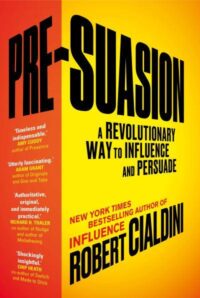Reading Notes for:


Privileged Moments
Profitable commercial organizations recognize the advantages of having good information
The prevailing problem for these organizations is that the rest of us can’t be bothered to participate in their surveys, focus groups, and taste tests. Even with sizable inducements in the form of cash payments, free products, or gift certificates, the percentage of people agreeing to cooperate can be low,
These scientists’ success was dismal: only 29 percent
But Bolkan and Andersen thought they could boost compliance without resorting to any of the costly payments that marketers often feel forced to employ. They stopped a second sample of individuals and began the interaction with a pre-suasive opener: “Do you consider yourself a helpful person?” Following brief reflection, nearly everyone answered yes. In that privileged moment—after subjects had confirmed privately and affirmed publicly their helpful natures—the researchers pounced, requesting help with their survey. Now 77.3 percent volunteered.
In chapter 10, we’ll explore the particular psychological mechanism (a desire for consistency) that led people to become more than twice as likely to comply under these circumstances. But for now, let’s derive a broader insight, one that is a major thesis of this book: frequently the factor most likely to determine a person’s choice in a situation is not the one that counsels most wisely there; it is one that has been elevated in attention (and, thereby, in privilege) at the time of the decision.
If you wish to change another’s behavior, you must first change some existing feature of that person so that it fits with the behavior. If you want to convince people to purchase something unfamiliar—let’s say a new soft drink—you should act to transform their beliefs or attitudes or experiences in ways that make them want to buy the product. You might attempt to change their beliefs about the soft drink by reporting that it’s the fastest-growing new beverage on the market; or to change their attitudes by connecting it to a well-liked celebrity; or to change their experiences with it by offering free samples in the supermarket. Although an abundance of evidence shows that this approach works, it is now clear that there is an alternate model of social influence that provides a different route to persuasive success.
